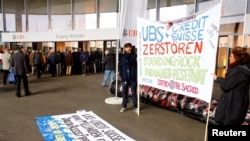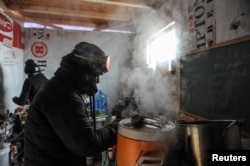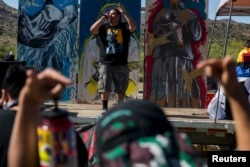Native American activists from the Standing Rock Sioux Tribe, in the U.S. state of North Dakota, have gone global with their fight to stop fossil fuel corporations from possibly fouling water sources by transporting oil on indigenous lands.
Peaceful protests that began April 1, 2016, to try to stop construction of the Dakota Access pipeline largely died down in February when the main protest camp was cleared. Oil drilling began on June 1.
While they may have lost this battle, the activists say the war is far from over. They say the fight for indigenous rights continues to be waged on many fronts nationally, and moves to expand it globally already have begun.
Dallas-based Energy Transfer Partners, the Dakota Access pipeline developer, disputes the tribes' claims and says the $3.8 billion, 1,885-kilometer pipeline is safe.
Rachel Heaton, a member of the Muckleshoot Tribe and an indigenous leader among Dakota Access pipeline opponents in Seattle, is one of four "water protectors" touring various countries and cities in Europe to try to drum up support for their cause. She said Native Americans plan to hit corporations and banks where it hurts most — in their wallets.
Credit Suisse targeted
"We are going around and sharing our stories as well as talking to the banks here in Europe that are invested in the fossil fuel projects on our lands," she said. "We are here to ask the banks to divest from the fossil fuel projects as they are contributing to the genocide of our people, the environmental racism that continues to take place, as well as the violation of our treaty rights."
She said the group of water protectors had come to Geneva to confront Credit Suisse, which is one of the largest financiers in the Dakota Access pipeline.
"They are invested in the fossil fuel projects on our lands that again continue to oppress our people. So we are here to send a message to Credit Suisse that they need to divest from these projects, as well as invest in policies that protect our indigenous nations," she said.
The activists were not successful in their quest. Credit Suisse refused to meet them. But the group said it would not give up, because the bank has invested $1.4 billion in fossil fuel projects on indigenous lands, making it the leading investor among all European banks.
The group, which began its European tour in Paris on May 20, has managed to ruffle the feathers of a significant number of shareholders in other banks as well. They crashed shareholder meetings at BNP Paribas, Natixis Bank and Societe Generale.
"We were not welcomed," said Heaton. "We were muffled out. We were booed. Some of the board members that were present avoided us. They went around the room and tried to avoid our question. They would not answer it," she said. "They did not say they would divest. They did not respond to us at all."
'We will continue'
Heaton said indigenous people would not be deterred by these setbacks. She told VOA that trying to get banks to divest from fossil fuel projects was a long process.
"We will continue to be a voice," she said. "We will continue to express ourselves in the way we have and continue the civil disobedience, taking people out of their comfort zones until these banks and these nations get the message."
Nataanii Means, an Oglala Sioux and Navajo activist and hip-hop artist, agreed that native communities would continue fighting for their rights.
"We have been fighting this kind of fight for years, and we are going to continue to fight it because it affects our communities first," he said.
"We are suffering the highest rates of cancer. We are suffering the highest rates of sex trafficking per capita. We are suffering the highest rates of suicide per capita.
"Our communities are on the front lines literally because we are affected first by these extraction companies — oil extraction, gas extraction and fracking," he said.
While in Geneva, the activists networked with United Nations officials, civil society and nongovernmental organizations. They met with Mayor Guillaume Barazzone, who pledged his solidarity with their cause.






